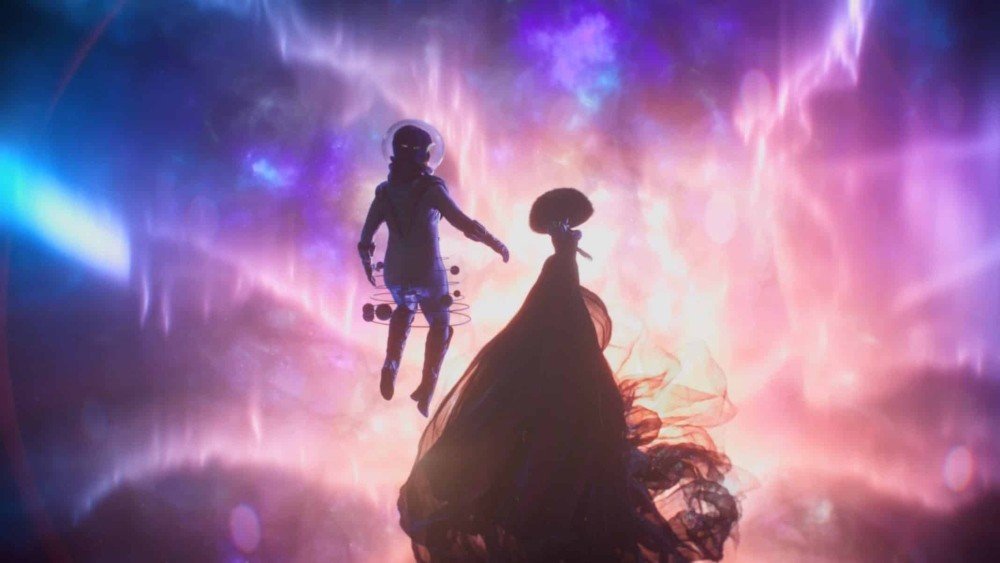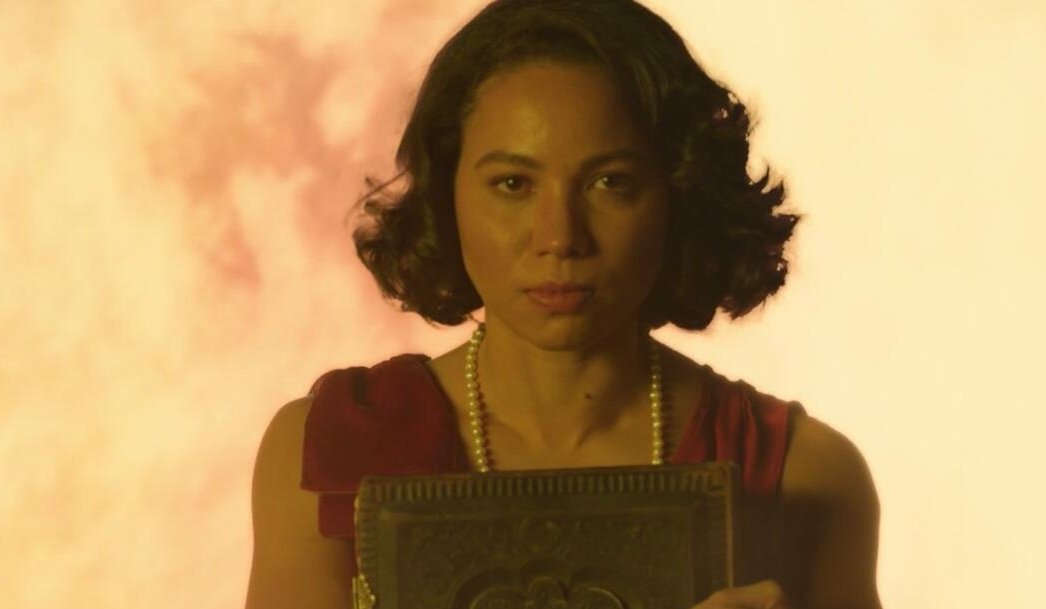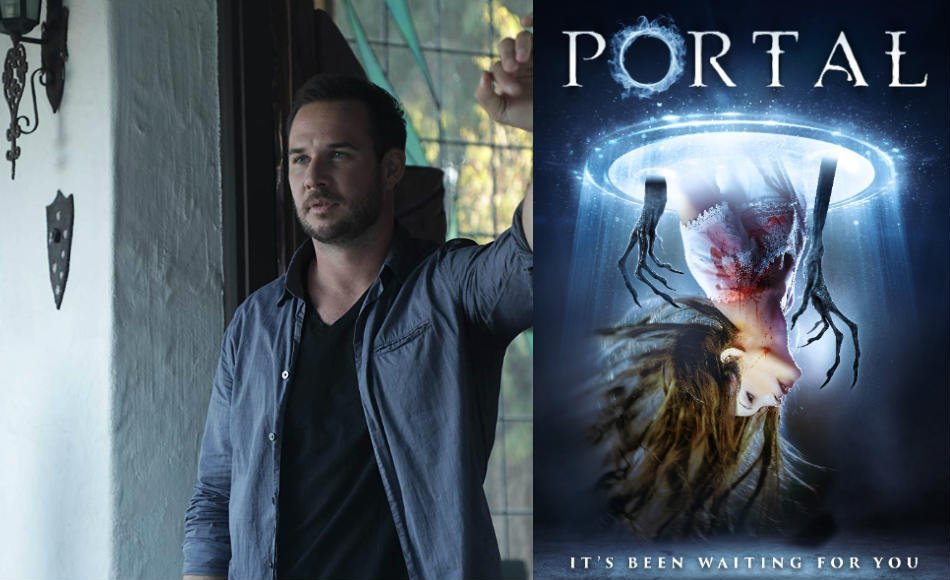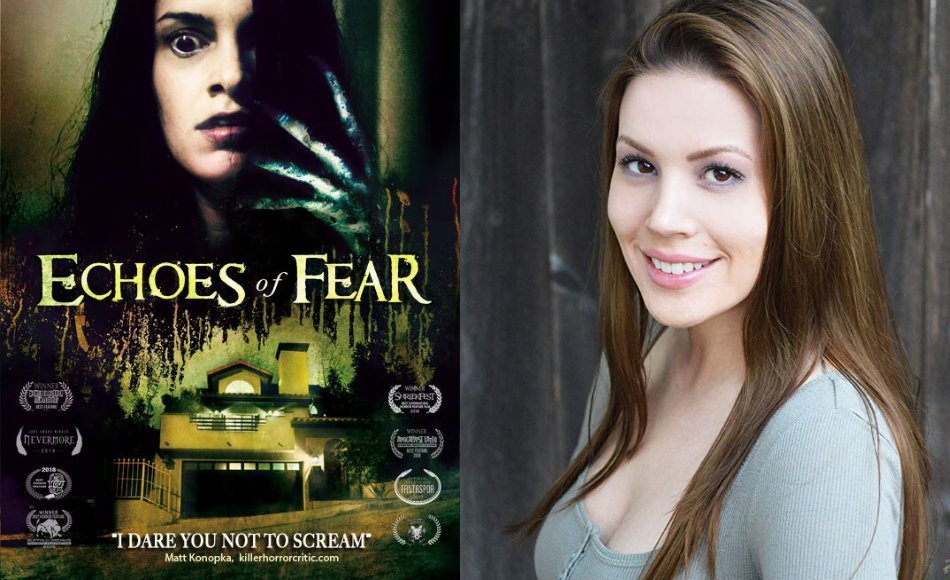Lovecraft Country continues to be one of the most thought-provoking horror series of 2020. We are already more than halfway through this nail-biting horror series, and plenty of discussion and fan theory is bound for us in this seventh episode of Lovecraft Country, entitled “I Am.” Thus far, Aunjanue Ellis’s performance as Hippolyta has been nothing short of heart wrenching in the series, but the latest episode sends our heroine to new levels of self-reflection and personal love for black women. With Misha Green as show creator, this reviewer’s desire for strong black female leads and storylines that deal with much more than just pain has been satisfied.
The episode begins with scraps of mangled paper spread all over the bedroom as Hippolyta tries to decipher the meaning behind Titus’ orrery. A flashback reveals that she journeyed back to the Braithwhite estate to understand the mystery, only to find the orrery perfectly intact but buried beneath the rubble. She slumps over on the ground in hopelessness before having the epiphany that the orrery’s planets need to be tilted for it to be a true to life model. She obliges, twisting the orrery’s wires, causing it to suddenly light up and begin rotating. At the top, a key is unleashed from its lock with an inscription at its core that reads, “Every Beginning Is in Time and Every Limit Of Extension of Space,” along with specific coordinates. We’re getting ready for some good ole black-girl magic.
Meanwhile, Christina tries to comfort a still distraught Ruby about their new revelation. Christina remains unfazed in her convictions, arguing that everything she said about William is true, including her words of romance to Ruby. Officer Lancaster succeeded in killing William, and Christina wants revenge, among other things. Christina states that though the words may have come from William’s mouth, she felt as if they were her own, further proving that she may have some romantic fascination with Ruby that goes a bit deeper than just the two adopting the skin of people in power.
Ruby demands here and now that Christina tell her everything, including the history involving Hanna and Titus Braithwhite. This ties to a dream that Leti has the same night about Hanna once again escaping from the burning mansion. Tic believes that there is a connection to them both seeing Hanna in their dreams, deducing that she must have been carrying the final pages of Titus’ collection.
Montrose awakens to his lover Sammy cooking him breakfast. It’s a lovely change of pace in contrast to the anger and vitriol that Montrose spouts every other episode. We know he’s gay, and in 2020 that can be extra difficult being black, so needless to say, in 1954 it could create major problems. Still, they both try to enjoy each other’s company as best they can before Montrose complains about Sammy’s cooking. It quickly devolves into a fight, with Sammy storming out of the front door.
Tic and Leti happen upon this just as Sammy leaves, informing Tic about his father’s sexual orientation. Tic calls Montrose the F-word, causing him to fly in a fit of rage about keeping his respect for his father. Tic is rightfully upset at his father, not because he is gay but because it finally dawns on him where Montrose’s sense of self-hatred comes from. Montrose took that hatred out on Tic in his abusive beatings, and the full circle of his family’s pain is realized in this powerful moment.

Narrating One’s Self
The coordinates Hippolyta finds leads her on a solo trip through the forested hills of the Midwest. Along her journey, she sees a black woman riding a motorcycle on an empty highway. This woman is actually Bessie Stringfield, a renowned motorcyclist that is responsible for being the first black woman to ride cross country in a motorcycle. Bessie’s journey was a tale of freedom and exploration, something Hippolyta has been yearning for since she was a little girl. This shot supplies an allegorical safe space for young black girls that always dreamed about riding along their own highway.
Meanwhile, Leti dreams of running through a burning mansion in much the same way Atticus viewed Hanna during his dream. However, in this rendition, Leti is pregnant and never actually makes it to the door before spontaneously coming afire. She recounts this dream to Tic, connecting the dots of the mystery dealing with their two families. Leti also deduces that she may be pregnant after not bearing the smell of Ruby’s garlic roasted tomato paste. While she wrestles with this, Tic visits an old friend of his mothers for more clarity into her life.
While it leads nowhere, Tic notices in photos a mark on his mother’s upper right arm that looks remarkably like the birth mark he has on his back, though this detail is not truly elaborated on. While dishing about her, Tic gets a call from a frantic Leti, who has finally noticed Titus’ orrery in Hippolyta’s room. This alerts Tic to Hippolyta’s precise knowledge and urges him to hop on the next bus to Mayfield, where the coordinates of the orrery point to.
Hippolyta reaches her destination, an observatory high in the green valleys of Mayfield. When entering the main room, she finds a telescope and a peculiar machine with various toggles and buttons she doesn’t recognize. She does, however, notice the numbers listed on the machines graph, and after a few knocks manages to get the thing moving after inserting her key. The podium glows orange and gold and rotates its gears, now looking a lot more like a galaxy’s rotational chart. “Mass, rotation, velocity, and radius,” she repeatedly whispers as the lights continue to flicker. It dawns on her that these sets of numbers are coordinates expressed by the podium’s star chart, prompting her to do her own science work in the observatory.
Beautiful graphs of math equations and quantum theory glow across the screen, perhaps this is the magic of her brain working itself out. Finally, she rotates the podium’s star chart before stopping in her tracks at the sound of voices nearby. Cops soon enter the room, find Hippolyta in a daze, and begin questioning her with force before a charging Tic blasts through the observatory doors. The ensuing violence causes one of the officers to shoot the podium, springing the machine to life again. Behind Tic, a tear in time and space continuously opens and closes in the same spot repeatedly, creating a rhythmic patter with the shutting and the closing. With the passing of each door into the next, locales and ecosystems change drastically on the tear. Tic manages to hunch his opponent over his shoulder before tossing him into the portal as Hippolyta stares at their creation.
While viewing the machine again, Hippolyta and Tic are both sucked into the portal, and she falls into a pool of stars and cosmos. Hippolyta sits still in a void of stars and space before beaming down in an asteroid on a planet as herself. She looks around on this new planet, a barren wasteland with no signs of life about its landscape. An android heart pulses on the horizon in white and gold splendor before glowing too bright for anyone to gaze at. From its powerful glare, two very tall androids descend on Hippolyta and lend their hands. The screen goes white followed by a naked Hippolyta waking up on a surgery bed with very strange purple markings on her arms.

Get Your Tinfoil Hat Ready
This sequence is not truly happening in the way we are presented; the original three sets of numbers on the time machine’s podium correspond to coordinates that Hippolyta is supposed to reach to time travel. The issue here is that these numbers are not truly defined or elaborated on to the audience, as it is up to the viewer to notice that the time machine requires the traveler to change pieces of their value. When Hippolyta first arrives on this planet, the coordinates lead her to an observatory that views stars. Why is this?
Because from the perspective of a lifeform in this realm, an observatory is the most likely thing to point an individual towards the procession and physics of the stars, a major factor in understanding how to operate the orrery. Since Hippolyta already knew both the coordinates and had the key to start the machine, the next most logical thing is for her to use the machine. The original coordinates correspond to a physical location on Earth, but the numbers inscribed on the time machine correspond to coordinates inside the viewer’s mind. As Hippolyta navigates the winds of her own character and hubris, the very makeup of this “prison” becomes a lot less like a prison and a lot more like an otherworldly playground. Hippolyta recites science equations and random bickering of things her father used to go on about with physics and the theoretical jargon of space time. She loses track of time itself and begins laying out theories on precisely what the makeup of the universe is. Simply put, Hippolyta is time traveling.
As her understanding of her experiences solidifies, eventually Hippolyta deduces how to hack into the side panel of the prison door she’s in. This prompts Seraphina to intervene, stapling Hippolyta to the ground with a digital forcefield. Seraphina asks Hippolyta who she is, something Hippolyta must laugh at to keep from shrieking in fear.
Titus Braithwhite had much more than just a time machine, it was an otherworldly portal that allowed the user to jump to whatever reality that they so desired. It is not simply about going to a physical location but transporting your spiritual self to other realities. These realities include onstage performances with Josephine Baker, bloody wartime battles with African hoplites, and finally back to a version of reality where George was still alive.
Hippolyta recounts all the details of everything she has discovered: the orrery, George’s death in another dimension, and the journey that led to the machine. She confesses to George that he did not truly allow her to be free and expressive as a woman the way she genuinely wanted to be. Instead, she shrunk herself, cutting her own dreams and aspirations for the sake of her family and George’s ability to travel freely. Hippolyta declares herself an explorer before taking George’s hands.
The pair are now space explorers, venturing through the cosmos, cataloguing flora and fauna as little alien creatures approach them to give shiny gifts. A narration of Sun Ra’s “Astro Black Mythology” plays as Hippolyta and George explore the cosmos. Sun Ra, who was an African-American jazz artist, speaks about the process of narrating one’s self, stating that you don’t exist in society because if “you” did, you would not be seeking equal rights. The end concludes with Sun Ra saying, “I’m actually a present sent to you by your ancestors.”
Much like Sun Ra, Hippolyta has written and rewritten herself various times to learn new experiences that her soul could not encompass in one body. This machine was not simply a time travelling device for Titus Braithwhite to reach the Garden of Eden, it is a multidimensional playground that allows the user to create their own fortune by simply speaking it.

The climax of this episode brings us Tic, tumbling out of the portal into the observatory, absent Hippolyta. A copy of Lovecraft Country is clutched in his hands. Though, curiously, the writer is listed not as Mark Ruff but instead—George Finch!
Join us for the next recap of Lovecraft Country, and maybe this horror series will soon reveal Ji-Ah’s dark mystery and more of Tic’s rocky family history.








